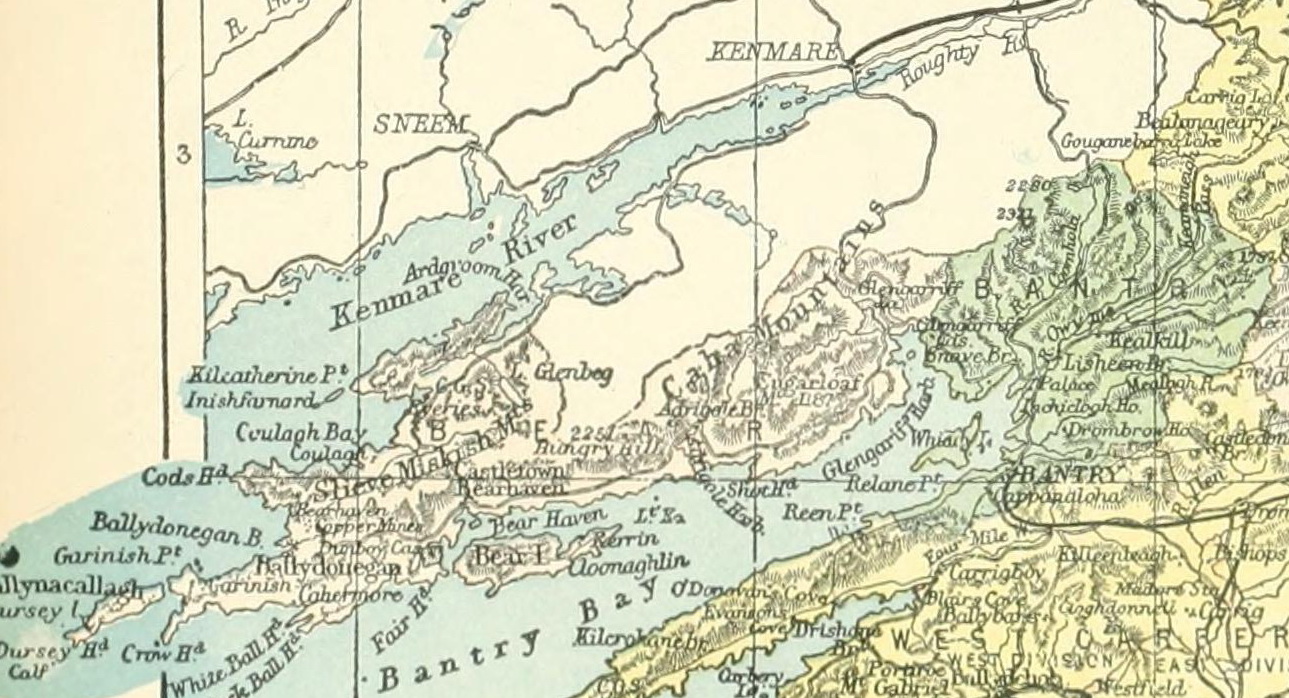
Figure 1. Baronies of Bear and Bantry.

From JCHAS:
Bear. This formed part of the wild and rugged territory lying between the bays of Dunmanus (co. Cork) and castlemaine (co. Kerry), called in ancient times Ivera, conjectured to be derived from a colony of the Spanish Iberi. In Ptolemy's chart the inhabitants were called Veabri or Bellibori; "Hibernie," says Dr. O'Connor, "Siol Ebir, obviously meaning Illiberi "Iberiae. According to legendary lore this district was by Modha Nuagat, king of Munster A.D. 166, named Beara in honour of his wife -
"The Spanish princess, beautiful Beara,
Daughter of Heber, the Castillian king,
Was mother of the valiant Oilioll Olum,
And the virtuous ladies Sgoithneamb
And Coinioll."Modha Nuagat, or Owen More, divided the government of Ireland with Conn Ceadchathach of "the Hundred Battles."
"The prince of Munster is known in history
By four most noble titles - Eogan More
Eogan Fidhfheathach, Eogan Taithlioch,
And Modha Nuagat."The southern part of Ireland was then called Leath Modha, "Modha's half" (hence the name Munster). The line of division is said to have been a range of sandhills, "Esker-Riada," extending from Dublin to Galway bay. At the time of the English invasion Ivera was in possession of the O'Mahonys, O'Sullivans, and O'Donoghues, and formed part of the sovereignty of the McCarthys (Caithhach) kings of Desmond or Cork, with whom they claimed Modha Nuagat as a common ancestor. The O'Sullivans were early divided into two septs - O'Sullivan Mor, chiefs of the district north of Kenmare bay, in county Kerry, and O'Sullivan Bear, of the mountainous district between Bantry and Kenmare bays, with a chief residence at Dunboy. "Donnell O'Sulevan Beare," of Dunboy, in a letter to Philip of Spain, "from the campe neere Kinsale," December 29, 1601, describes their descent as deriving "roote and originall from the famous and most noble race of the Spaniards" - viz., from Milecius, "sonne to Bille, sonne to Breogwin, and from Lwighe, sonne to Lythy, sonne to Breogwin, by the testimony of our old ancient bookes and antiquities, our petigrees, our histories, and cronicles." The fortunes of the O'Sullivan were completely wrecked by the rebellion of 1641 and subsequent wars of the Revolution. Bearhaven gave the title of viscount to the Berkeleys, who were Viscounts Fitzhardinge of Bearhaven, and at present there is Viscount Chetwynd of Bearhaven (Geo I), both English families. Although it is possible the names Ivera and Bear are merely corruptions of more ancient designations descriptive of the nature or position of the country, Irish philologists generally have conceded them a Spanish origin. That Spanish existed along this coast there is well-authenticated evidence.
The 1659 census did not enumerate by household. However, surname frequencies were noted. Below is a list of the surnames found in Bear and Bantry, in descending order of frequency.
| Surname(s) | Number |
|---|---|
| McDaniell and Daniell oge | 35 |
| McTeige and Teige oge | 33 |
| McShane | 30 |
| McDermod and Dermod oge | 29 |
| McOwen and Owen oge | 22 |
| Murphy | 17 |
| McDonagh | 12 |
| McCnohor | 12 |
| O Shea & Shea | 11 |
| Sullivane | 9 |
| McCragh | 8 |
| McMurtagh | 8 |
| Downey | 7 |